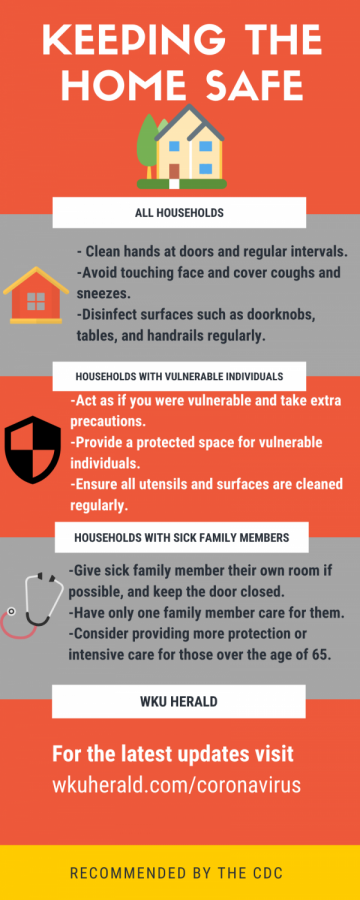What you need to know when quarantining at home
January 18, 2021
WKU has implemented guidelines to protect students on-campus from COVID-19 transmission, but students who live at home or locally need to know how to protect themselves from contracting and spreading the disease.
Students should stay away from campus and public areas if they develop a fever, cough, or shortness of breath, according to the CDC. If travel is necessary, those with COVID-19 symptoms should not use public transportation.
The CDC says once COVID-19 symptoms are detected, they should be monitored carefully. A healthcare provider should be contacted if symptoms worsen and if medical emergencies arise. Concerning symptoms of COVID-19 include chest pains and breathing issues.
The CDC recommends designating a specific bedroom and bathroom for a person with COVID-19 symptoms. Surfaces that are touched frequently by a person with COVID-19 symptoms need to be cleaned often.
Those with COVID-19 symptoms can protect the people they might come into contact with by wearing a face mask. CDC Director Robert Redfield believes that face masks can mitigate the spread of COVID-19.
“Cloth face coverings are one of the most powerful weapons we have to slow and stop the spread of the virus—particularly when used universally within a community setting,” Redfield said. “All Americans have a responsibility to protect themselves, their families, and their communities.”
The CDC recommends refraining from sharing personal items when someone in a household is experiencing symptoms of COVID-19.
Students can combat their COVID-19 symptoms by washing their hands often, staying hydrated, and getting plenty of rest. Any sneezes or coughs should be covered, according to the CDC.
COVID-19 symptoms can appear between two and 14 days after initial exposure to the virus. WKU students can call the university’s COVID-19 hotline at 270-745-2019 if they are feeling sick.
Leo Bertucci can be reached at leo.bertucci665@topper.wku.edu. Follow him on Twitter @leober2chee.















